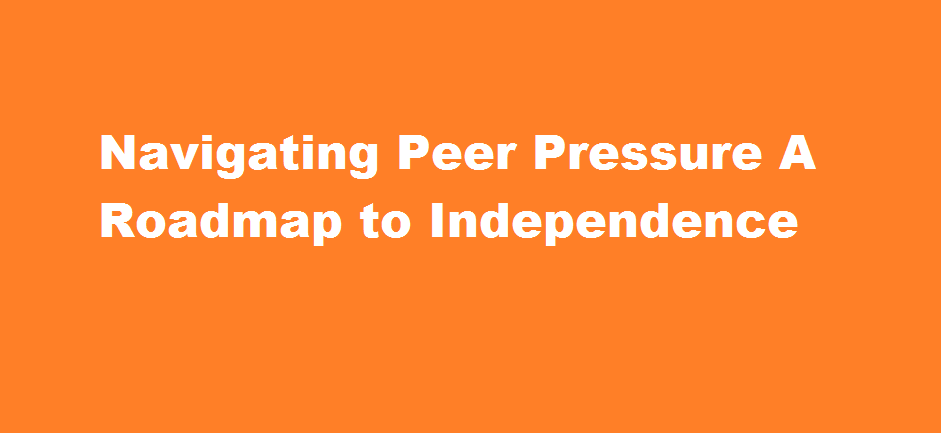Navigating Peer Pressure A Roadmap to Independence
4 min read
Introduction
Peer pressure is a significant influence faced by individuals, particularly during adolescence and early adulthood. The desire to fit in and be accepted can lead to making choices that may not align with personal values and goals. However, learning to handle peer pressure empowers individuals to make independent decisions and maintain their authenticity. In this article, we will explore practical strategies to deal with peer pressure, enabling individuals to navigate social dynamics while staying true to themselves.
Understanding Peer Pressure
Peer pressure occurs when individuals feel compelled to conform to the behavior, beliefs, or values of their peers. It can manifest in various forms, including direct pressure, indirect influence, and self-imposed expectations. It is essential to recognize that peer pressure is a common experience, and everyone encounters it to some extent. The key lies in developing the resilience and confidence to make choices that align with personal principles and well-being.
Building Self-Awareness
The first step in dealing with peer pressure is to cultivate self-awareness. Understanding personal values, goals, and boundaries provides a solid foundation for decision-making. Reflect on what truly matters to you and identify your priorities. This self-reflection helps build confidence in making independent choices that are in line with your beliefs. Additionally, acknowledging your strengths and weaknesses allows you to resist the need for validation from others and stay true to yourself.
Choose Positive Influences
Surrounding yourself with positive influences is crucial when dealing with peer pressure. Seek out individuals who share similar values, goals, and interests. By fostering relationships with like-minded people, you create a support system that reinforces your authenticity. These individuals will understand and respect your choices, making it easier to resist negative peer pressure. Engage in activities and communities that encourage personal growth and provide a positive environment for self-expression.
Assertiveness and Effective Communication
Developing assertiveness skills is essential for navigating peer pressure. Clearly and confidently express your thoughts, opinions, and boundaries without fear of judgment. When faced with pressure, communicate your position firmly but respectfully. Practice saying “no” when a situation conflicts with your values or makes you uncomfortable. Effective communication allows you to assert your independence and gain respect from peers. Remember, you have the right to make decisions that align with your well-being and aspirations.
Develop Problem-Solving Skills
Building problem-solving skills empowers you to find alternative solutions when faced with peer pressure. Analyze potential risks and consequences of certain choices, considering both short-term and long-term effects. Seek advice from trusted mentors or adults who can provide guidance in challenging situations. By exploring various options, you can make informed decisions that support your growth and protect your values. Developing problem-solving skills enhances your ability to navigate difficult social scenarios and make choices that contribute to your overall well-being.
Resilience and Self-Reflection
Resilience is a valuable trait when dealing with peer pressure. Understand that setbacks and challenges are a part of life. When you encounter resistance or negative peer influence, reflect on your experiences and learn from them. Evaluate how your choices align with your values and goals. Embrace self-improvement and recognize that growth often arises from adversity. Celebrate your accomplishments and reinforce your confidence in making independent decisions. Cultivating resilience helps you stay grounded in your principles and navigate peer pressure with strength and authenticity.
FREQUENTLY ASKED QUESTIONS
Why is it important to not give in to peer pressure?
Peer pressure can influence a person to do something that is relatively harmless — or something that has more serious consequences. Giving in to the pressure to dress a certain way is one thing — going along with the crowd to drink or smoke is another.
Why is it important to address peer pressure?
Positive peer pressure can help teens develop the coping skills necessary for adulthood. It might encourage teens to become more active in athletics or to avoid risky behaviors, which can be especially helpful during tough times.
Negative peer pressure can lead teens in bad directions. It could lead them to try alcohol, drugs,skip school or engage in other poor behaviors that could put their health at risk.
Conclusion
Peer pressure is an inevitable aspect of social interactions, but it does not have to dictate your decisions. By building self-awareness, surrounding yourself with positive influences, honing assertiveness skills, and developing problem-solving abilities, you can effectively handle peer pressure. Remember that staying true to yourself is a journey that requires continuous self-reflection and resilience. Embrace your individuality, celebrate your uniqueness, and make choices that align with your values and aspirations. By doing so, you empower yourself to navigate peer pressure with confidence and lead a fulfilling life of authenticity.
Read Also : How To Overcome Poverty






